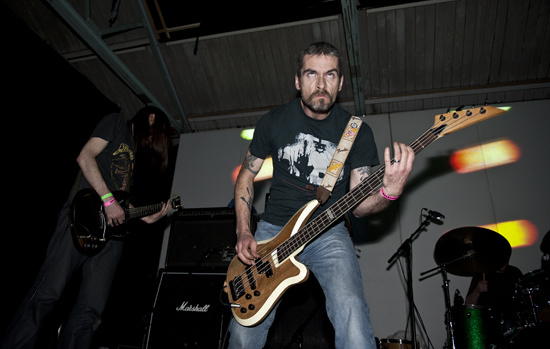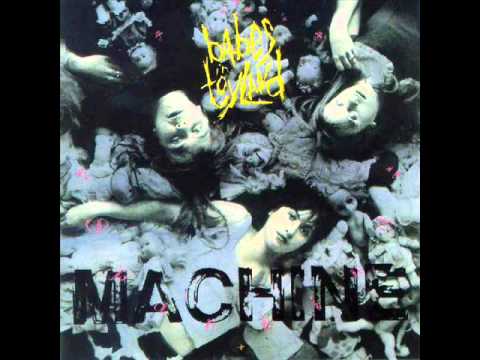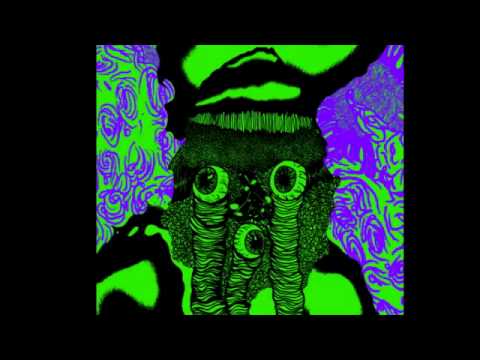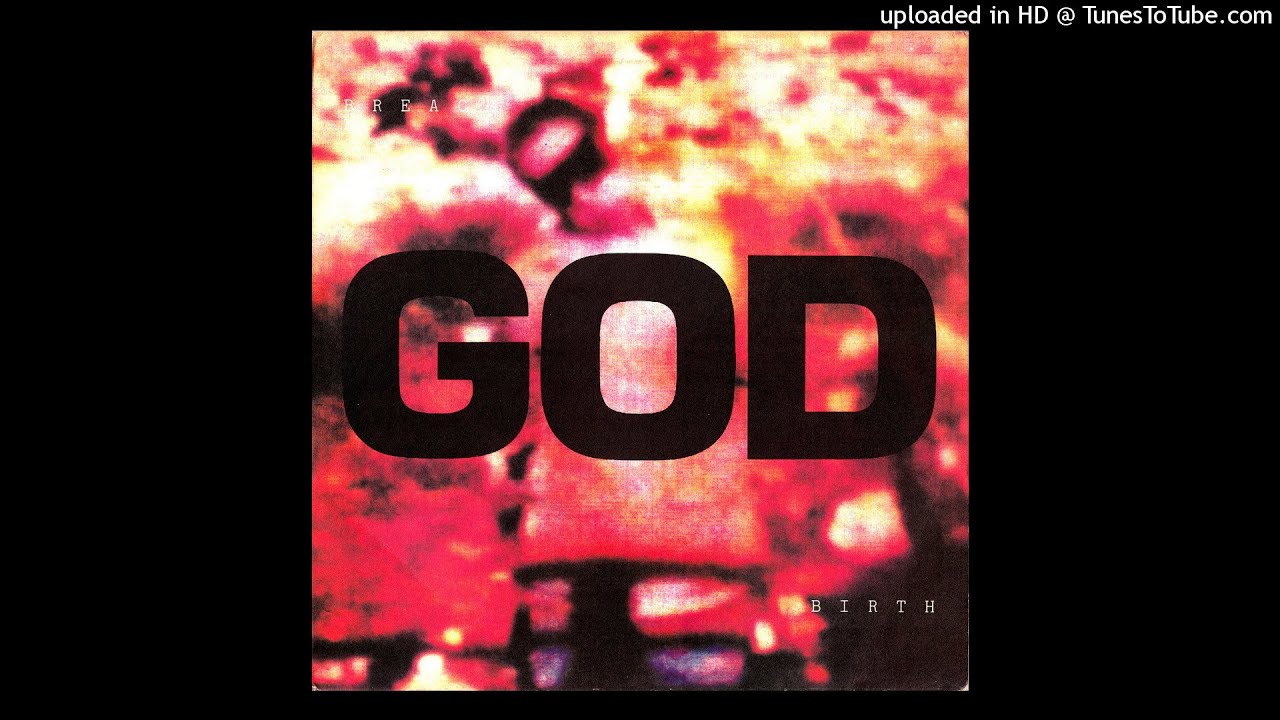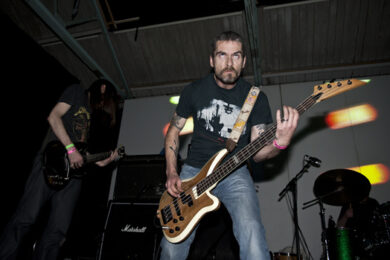Drunk In Hell. All photographs courtesy of Katja Ogrin
I hate punk rock*. I’m sick of having to pretend that I like it. If you took every single punk song recorded between 1976 and 1978 and added them all together, the resultant pusillanimous, piss weak mess wouldn’t even equal one twentieth of the power and fury of ’22 Going On 23′ by the Butthole Surfers. Noise rock was my punk. And it still is. Here are 40 of our writers’ favourite tracks from the ‘genre’. I think you’ll find that all of them are significantly better than ‘Frigging In The Rigging’, ‘Up Yer Bum’ and ‘The Sound Of The Suburbs’.
John Doran
(*with the exception of NOMEANSNO, Plastic Bertrand and CRASS)
Here is a handy (partial) Spotify playlist of this top 40.
Arab On Radar – ‘My Mind Is A Muffler’
I bow so very low, I slime and I beg, at the feet of neo-no wave jesters Arab On Radar, and their unique brand of avian hysteria; one of my favourite sounds in all of noise rock, my favourite guitar genre. The Rhode Island fourpiece, after meeting in 1994 at a failed interview for nuclear submarine manufacturers, Electric Boat, went on to parody brutally the fear-rotten WASP culture of their native New England, by taking on the form of the very same moral panic White America’s north-eastern Protestant heartland is build on. It was like nothing else. The searing ‘My Mind Is A Muffler’, touching on the band’s favourite themes of mental ill health (as true freedom) and trisomic retardation (because what else do those pure-bred Blue-Staters fear more?), is a masterpiece of mad nihilism and mocking irrelevance inanity. In other words it’s essentially how all punk should sound: an electric-mechanic maelstrom of stupidity situated where The Residents meet Venetian Snares, and deeply discomfiting.
John Calvert
Årabrot – ‘I Rove’
Norway’s Årabrot – aka tall man, Kjetil Nernes – may have released the rock album of 2016 (so far) in the shape of The Gospel but way before this widescreen, career-defining statement, they were a much dirtier, noisier and altogether more punishing proposition. In 2009, the then duo celebrated signing to Fysisk Format with an EP so astounding, I’m still picking through pieces of it now. ‘I Rove’ starts with a pulverising bass line and marshalled feedback and teaches the listener a twenty minute long lesson in delayed gratification. Joining the dots between the Birthday Party, Metal Machine Music, Godflesh and Confusion Is Sex, it tells the story of a seafaring voyage that goes terribly wrong in physical, psychological and spiritual terms as skilled technicians take us through a constantly shifting landscape of chaotic sounding but strictly controlled machine and guitar noise. And yet, listening back to it now, you can feel the beauty and order trying to force it’s way up to the surface. Eventually the resolution comes complete with ringing piano chords. A truly sublime experience in the real sense of the word; it feels like gazing at the huge wave you know will kill you in a couple of seconds’ time.
John Doran
Babes In Toyland – ‘Pain In My Heart’
It’s odd that journalists ever thought Babes In Toyland were a Riot Grrl band. They’re not, which is why I fell so hard for 1989 album Spanking Machine. Riot Grrl’s empowerment turned me off – I needed to get lost in music, not be found. The Minneapolis three-piece seemed surrounded by bad shit. Pictured on the cover of ‘Handsome And Gretel’ was singer and guitarist Kat Bjelland as a car crash victim; on the back was drummer Lori Barbero’s mangled nose. Bjelland sang from deep in the tangle. She was debased, hate-filled and un-self aware. A product of the patriarchy in that her vitriol was often spat at other women. But she was pretty one moment, grit and grot the next – and I learnt girls could be both. She sang of things only women could understand. “Vomit my heart/ Pull my legs apart” (‘Vomit Heart’). ‘Pain In My Heart’ is slow and gruelling. The rhythm section gives damaged, dogged support to Bjelland’s howls, hog-tied to her pain. Several songs on Spanking Machine ask questions – “Why do you make me feel so bad?” (‘Swamp Pussy’) – but Bjelland’s bellowed question here is rawest of all: “Why did you leave me?” Her later "ugh" is rock & roll’s most disgusted guttural utterance ever and her string of swearing is epic. And listening to Spanking Machine 27 years on, her questions hang, frozen in unanswered anguish.
Kate Hennessy
Big Black – ‘Grinder’
“A man is known by his tools/I earn my keep with my tools,” growls Steve Albini, over clanking, metallic guitar, furiously agitated bass and a drum machine of triumphant tinniness. Indeed he is. And the Big Black main man certainly does. This track – from the trio’s 1987 Headache EP – barely hits the two-and-a-half-minute mark, but that’s ample time for it to suggest itself as the sound of a disco in a smithy at the end of time. ‘Grinder’ thrills – casually, brutally, funkily – with all the hallmarks of BB, not least of them a title so apt, it’s almost onomatopoeic (see also ‘Steelworker’ and ‘Pavement Saw’). “Warning! Not as good as Atomizer!” read the original EP’s tongue-in-cheek sticker, pre-empting any fans of that album who might decide the band had gone soft in the interim. As if.
Sharon O’Connell
Bitch Magnet – ‘Dragoon’
Bitch Magnet are a group that haven’t quite been aligned as prominently in the historical lineage of the noise rock genre as some of the more familiar names but a great deal of their material ranks alongside some of the most fiery and stimulating of the period. Perhaps this is because they tended to genre-hop a fair amount, moving from sneering post-hardcore to earth-shaking sludge riffs via the sort of elongated atmospheric guitar drones that would have been no doubt been labelled slowcore at the time – they operated within a sound distinctly of its time but also of it own personality. ‘Dragoon’ succeeds in encompassing all of these elements in its nine-minute plus length, wavering between the sort of groggy guitar fog that Codeine or Slint were beginning to put together and the itchy, unrelenting guitar charge of Shellac before Shellac even existed. The real beauty of this track though, and arguably Bitch Magnet as a whole, is that the all over the place fabric that wove it together isn’t represented by a mania or an unhinged messiness, it’s blistering but its also fluid and cohesive. ‘Dragoon’ in many sense plays out like a condensed album, taking one on an expansive, varying, voyage you can get lost in but whilst still retaining a core tone and personality.
Daniel Dylan Wray
Butthole Surfers – ‘Jimi’
The completely bonkers and brilliant Butthole Surfers have such a majestic catalogue of insanity that it is tricky to dial down to just one favourite from the pack, but if forced ‘Jimi’ is the one for me. Twelve and a half minutes of madness, three-quarters of which sounds like it was summoned from the depths of hell. With Gibby Haynes alternating his pitch-shifted vocals between devilish molesting cackle and terrified childlike pleading, all while Paul Leary weaves and bends guitar lines on the top. The sound of total terror only to end with a beautifully lilting guitar pattern backed by birdsong and the sounds of farm life – an end to the nightmare. It is really evocative, always makes me think of rising through the ground from the depths of some sort of hell into a beautiful spring meadow.
Matt Ridout
The Chinese Stars – ‘Left Brain’
A mid-2000s safehouse for members of Providence, RI bands Arab On Radar and Six Finger Satellite (after both broke up and before both reformed), The Chinese Stars channeled those bands’ no wave-derived obnoxiousness into something more sleazy and danceable. In principle, their second album Listen To Your Left Brain could have made a splash, even if it was two or three years late for dance-punk’s zenith, but the most we can confidently state about its sales is that they weren’t bad enough to bankrupt Three One G, their label. …Left Brain’s almost-title track is basically a noise rock version of cock rock, which is to say that it’s lyrically objectifying and priapic, but tempered by Eric Paul ‘fessing up to his own inadequacies via an insouciant vocal squawk. It’s also powered by a big dumb lumbering riff and a glowingly synthetic funk bassline. A party rocker that never was, this song is a long-term afterhours people-round staple for me; sometimes I even remember that it’s listed in the wrong order on the back of the CD. The Chinese Stars also made a video for the song, which fans of erotica subgenre ‘sploshing’ might like to check out.
Noel Gardner
Cows – ‘Shitbeard’
Amphetamine Reptile stalwarts Cows have a pretty rich discography, much of which seems to be getting a much needed repress from the label. Cunning Stunts really is a necessity for anyone with a passing interest in the 90s American underground, and follow-up LP Sexy Pee Story is a must have as well, featuring this track ‘Shitbeard’. Vocalist Shannon Selberg was an eccentric showman, famous for odd behaviour including performing reverse strip teases (coming onstage naked then getting dressed if you are having difficulty working out what that is), dangling mousetraps from his ears, and drawing on his face in permanent marker a moustache that lasted an entire tour being just a few examples. But for all that, Cows were not merely the Shannon Selberg freak show, they were easily one of the most accomplished bands to see at the time and produced some of the best music of any in the AmRep roster.
Matt Ridout
Dethscalator – ‘Internet Explorer & Friends’
As befits a band who never bothered to learn the name of their original drummer and who recorded songs called ‘Shit Village’ and ‘It’s What They Call The Clubhouse, Arsehole’, it’s fair to say London’s Dethscalator were never aiming for the cover of The WIRE. I’ve promised all of them individually that I will stop going on about the ingestion of narcotics but, personally, I think the album title Racial Golf Course No Bitches – inspired by a vision of evil suffered by drummer Stu Bell – tells you all you need to know. Like Van Halen and EYEHATEGOD trying in vain to fight their way out of a k-hole, Dethscalator truly were a band for their age. Which just happened to be 1666AD. RIP Dethscalator. We will never see their like again. (But you should check out current projects by former members, including Sex Swing, Casual Nun and Casual Sect.)
Divorce – ‘Aids Of Space’
During their brief but illustrious life, Glasgow noise monsters Divorce left a legacy of true destruction across a variety of releases, but ‘Aids Of Space’ from their spectacular (and only full length) album is their finest moment. Over a see-saw, suppurating guitar riff and clattering drum blasts, Jenny Fulk delivers a vocal performance that is so deranged it sounds like someone biting down on a live bullet and howling at the aftermath. The track’s climactic lurch into doom territory is pure ecstatic noise by a group who are sorely missed by fiends everywhere.
Kevin McCaighy
Drunk In Hell – ‘Hungry For Blood’
This track, the first one on the first demo by Teeside’s Drunk In Hell, is nearly eight years old, and bless its little fuckin’ heart, it hasn’t aged a bit. This is because it would make no sense to attribute an ageing process to a song which is basically one riff, repeated for six or so minutes with as much force as possible, bolstered by a vocal performance of hideously bellowed oaths and feedback that crumbles one’s fillings. You can own and use ‘Hungry For Blood’ in two versions: the aforementioned 2008 one, which the band recorded on a four-track tape machine, or a minor update from 2012, released earlier this year as one side of a split seven-inch with presumed DIH influence Kilslug. The more recent one is half a minute shorter, has more prominent bass and might appeal more to metal fans, but the important takeaway here is that Drunk In Hell are the best noise rock band in the world and I am unconcerned about repeating myself stating so.
Noel Gardner
Ex Models – ‘That’s Funny, I Don’t Feel Like A Shithead’
On 2005’s Chrome Panthers Ex Models shared more than two players with Oneida, core member Shahin Motia and guest drummer Kid Millions — they also nailed a similar air of whip-sharp compositional sophistication disguised as shattering, brutish intensity. Yet where the latter group’s music tends towards low-slung and bluesy, Ex Models are nasty, brattish and acerbic, their tracks snapped together from eardrum-lancing treble-heavy guitar tones that ricochet around the mix like an angry wasp trapped inside a fizzy drink can — closer in tone to the punkish snarl of labels like Three One G (with whom the group had previously released a split single). But it’s the addition of both Millions’ drumming and a hitherto buried penchant for psychotic repetition that makes Chrome Panthers such a disturbingly mesmerising record: ‘That’s Funny, I Don’t Feel Like A Shithead’ is a dizzying, moiré-patterned riff-mesh where razor-wire guitars run uneasy circles around Million’s complex, elliptical percussion. Experienced live at the time (on a mighty day at ATP 2006 alongside Oneida, Blood Brothers and Liars) it was enough to take your hair off — the overtly chemical, basement-brewed bad trip juice to Oneida’s rather warmer, subtler (albeit still body-battering) psychedelia.
Rory Gibb
Flipper – ‘Sex Bomb’
That first rush of hardcore punk turned dumb right quick, mostly due to the scene being overtaken by macho pricks raring for a fight. Flipper wanted a fight, too – Henry Rollins has claimed that he was scared shitless of them – but these San Francisco reprobates disliked doctrinaire pit rats just as much as the rest of society. To them, the battle was less punks vs. squares than Flipper vs. everything. Turning away from the punk-qua-punk of their previous band Negative Trend, and with that the last vestiges of their desire to be liked, Flipper kicked off their reign of terror by giving birth to this mutant baby of a track, with stump-dumb distorto bass played too slow for the circle pit, careening guitar that sounds akin to spilt sulfuric acid, and perhaps the dumbest "lyrics" ever not written by AC/DC coughed out by that guy who’s always standing outside your building claiming he used to be a pro boxer. If you’re not its target audience, ‘Sex Bomb’ still has the power to irritate, its loping proto-pigfuck heroin stumble resolutely unsatisfying to anyone whose kink it ain’t.
Dustin Krcatovich
Fugazi – ‘Suggestion’
If one of the primary outputs of noise rock is to provide a sense of tension and release, to bounce between feelings of the recoiled and acerbic to the monstrous and cacophonic then one of the genres chief champions of such a function are unquestionably Fugazi, a band that could operate as the most tightened, spring-loaded bunch, ready to detonate at the stomp of a foot pedal or the signalling of a cowbell. ‘Suggestion’, taken from the group’s debut EP, seems to embody so many aspects of the band in its singular creation: Ian MacKaye’s drill sergeant bellow; Joe Lally’s bass line that weaves between post-punk, funk and dub; the highly politicised lyrical content, in this case the song being an anti-rape statement cum anthem, and the sonic coalescence of it all that turns it into one Fugazi’s most explosive moments. It’s real power and teeth-cracking intensity comes from the fact that the music fizzles with a sense of venom and seething rage to match those of the lyrics. However, MacKaye doesn’t position himself as the higher power above all other men, he sings from the ground up, as he points out whilst almost spewing the closing line “But, we are all guilty."
Daniel Dylan Wray
Future Of The Left – ‘Failed Olympic Bid’
Future Of The Left are only the band Mclusky could have been. It’s a shibboleth muttered in the tiniest of circles, no bigger than, say, the centre circle of a football pitch, while the rest of the stadium bays for a Mclusky reformation, returning to the glory days when they used to sell out the Garage biannually and shift fives of thousands of records. It’s as if Mr Bronson has taken over at Grange Hill – the shoes shine brighter and the kids are more attentive through mind terror – but people will always hanker for Mclusky. It’s to Andrew Falkous’ chagrin no doubt, but fear not, it’s chagrin that drives him on; well, that and a gloriously sardonic sense of humour. “I’ve got a place for the American base,” he growls on ‘Failed Olympic Bid’, “Right in the middle of Rotherham’s steel mills/ Imagine the boost for the local economy/ Like anybody cares about the north of England.” It’s perhaps typical that when Emeli Sande and the Arctic Monkeys were aligning themselves with the best hop, skip and jumpers in the world, that Future Of The Left were turning their attentions to a blight best forgotten about – Manchester’s bid to host the Olympics in the year 2000 (trumped by Sydney, Australia). The London bid had pizazz, it had Prince William and David Beckham and David Walliams in a swimming cap. The Manchester bid had Julie Goodyear in a pub, and Stan Boardman standing outside in the rain with a Racing Post under his arm smoking a butt rollie. And what about the noise I hear you cry? It’s as noisy as one of Fatima Whitbread’s grunts as she throws something heavy really far.
Jeremy Allen
God – ‘Meat Head’
If there was one band that I would really like to jump into a DeLorean, punch up to 88mph and travel back to see it would be Kevin Martin’s seminal God. ‘Meat Head’ is off the Breach Birth 12" and can be bought for a song on Discogs and is really something that should be snapped up. What you get is an unhinged free jazz squall over the punishing industrial rhythm whilst Kevin tells you “There’s no end in sight” – for eight and a half minutes. It’s perfection.
Matt Ridout
Gore – ‘Mean Man’s Dream’
Gore were an instrumental Dutch power trio that certain Melody Maker journalists got quite excited about back in the magazine’s 80s heyday. It’s easy to see why – Gore offered the same brutalist noise aesthetic as genres such as thrash and death metal, but without any of the adolescent baggage. That is of course unless you read the inner sleeves of their albums, which featured ‘lyrics’ for each song consisting of various angst-ridden male power fantasies. But man, the riffs… ‘Mean Man’s Dream’, the title track of their second album, is Gore in excelsis, the components of the song hammered together piece by piece like the assembly of some monstrous weapon. And while there isn’t a hint of jazz or blues in the sound, the strafing main riff actually swings when it finally comes, though there’s a strange stop and go dynamic to the track, just in case you start enjoying yourself too much. And that’s essentially Gore in a nutshell: a combination of harsh severity and teenage strop. If their first two albums deconstruct metal for a noise rock audience, then their third album The Cruel Peace pretty much invents an extreme strain of post-rock, but that’s another story.
Joe Banks
Happy Flowers – ‘Mom, I Gave The Cat Some Acid’
About a decade ago, a U.S. soldier stationed in Iraq contacted renowned freeform radio stalwarts WFMU in hopes of procuring some appropriately grating music for use in detainee interrogations. Just what did he have in mind, you ask? C’mon, chump, you know where this is going. The duo of “Mr. Horribly Charred Infant” and “Mr. Anus” were pretty much a one-joke band, their “songs” written from the perspective of a constantly terrified young child and usually yowled over a din of gnashing freeform squall somewhere between Throbbing Gristle’s ‘Subhuman’ and latter-day screechers like Harry Pussy. A recipe best served in small doses, to be certain (and best before they were gauche enough to add actual riffs and drums into the mix), but their high points are transcendent in their white-heat clatter and wilful idiocy. Though little different in concept or execution from the other tracks which would later appear on their first LP My Skin Covers My Body, the rendition of ‘Mom, I Gave The Cat Some Acid’ that kicks off their debut single Songs For Children is the track for which they will most likely be remembered, providing both the heartiest yuks and the most satisfying furnace blast.
Dustin Krcatovich
Head Of David – ‘Roadkill’
At a time in the mid-80s when all the significant records seemed to be coming out of the US, Head Of David were a very British outpost of noise, a punk/metal amalgam of twisted wreckage and Black Country psychosis. If debut album LP was an oil-stained scrapyard horrorshow, the Steve Albini-produced follow-up Dustbowl combined the brutal, mechanised riffology of Big Black with the lumbering, almost cosmic heaviosity of early Sabbath/Budgie. ‘Roadkill’ is the stand-out track, and boasts what’s for me one of the greatest riffs in rock, a churning, plunging vortex of notes that sucks the light from the air. The song barrels along like the malign juggernaut from Spielberg’s Duel, implacable and deadly, its hub caps squealing against the crash barrier, while singer Stephen Reuben Burroughs harangues the listener from the sidelines, a carny show shouter building himself into a frenzied declaration of “I Am Roadkill!” Comprehensively ignored by the press, drummer Justin Broadrick left to write the next chapter of industrial noise with Godflesh, while the rest of the band perversely looked for inspiration to Turbo-era Judas Priest on their nail-in-the-coffin final album Seed State.
Joe Banks
Hey Colossus – ‘A Witch Is Born’
The first album by English crypto-psych heavy rock gentlemen Hey Colossus is 12 years old and has been out of print for almost all of that time. It’s called Hey Colossus Hates You, and blanket hatred is surely the only reason why they refuse to reissue it. Actually, there could be any number of valid reasons I’m not party to, but the mood of the general public – even just a few hundred of them – would surely be buoyed by the chance to wrap their faces round HC’s most dissonant, classically noise rock release. ‘A Witch Is Born’ takes up the whole B-side, its 18 minutes starting as drone doom a la Melvins’ Lysol and hyping itself into a sludge metal crescendo of sorts about two-thirds of the way in. It’s a different kind of hypnosis than the Krautrock-influenced brainbashers they’ve done more recently, but still way potent.
Noel Gardner

Hey Colossus
The Jesus Lizard – ‘Then Comes Dudley’
Gibbering, spittle-soaked vocals and uber-abrasive post-punk instrumentals – that’s the popular idea of The Jesus Lizard. And it’s reasonably accurate. But for every noisily eruptive ‘Mouth Breather’ or ‘Seasick’, there’s a terrifyingly precise, deep-grooved tune in which they play the long game with moody, dick-swinging aplomb. Cue the opening track on their second (splendiferous) album, 1991’s Goat. It throbs with dread from the very first notes, David Wm Sims’ punishing bass the portent of some unspeakable horror on the horizon. And Duane Denison’s guitar interpolation of the trumpet motif from Miles Davis’s ‘Great Expectations’ hardly calms anxieties, its scalpel-sharp malevolence prodding the song along until the (late) appearance of David Yow’s heaving poetics. It’s a masterwork of minimalist, sustain/release tension. And it rocks like a mutha.
Sharon O’Connell
Laddio Bolocko – ‘Nurser’
Formed by guitarist Drew St. Ivany, bass player Ben Armstrong and drummer Blake Fleming, and later joined by Marcus DeGrazia on horns, Laddio Bolocko spent much of their 1996-2000 existence in hermetic isolation in their rehearsal space in the Dumbo section of Brooklyn and later in an abandoned ski lodge in Elka Park in the Catskills, honing their intense, distinctive sound. Although many bands both before and since have claimed the likes of This Heat, Can and Albert Ayler as inspiration, Laddio Bolocko’s recent Live And Unreleased 3 LP set on No Quarter makes a convincing case for their pre-eminence amongst such other pretenders. ‘Nurser’, which originally appeared on their first LP, Strange Warmings Of Laddio Bolocko, and can also be found on the 2-CD collection, The Life And Times Of Laddio Bolocko, is a prime example of the transcendent, amp-shredding din of their early material. A thirty-second electronic pulse reminiscent of This Heat’s ‘Testcard’ is supplanted by sheets of coruscating guitar and a propulsive, locked drum beat. Straining both against its own inherent density and the limits of any speakers one might choose to play it through, the track progresses through numerous abrasive shifts in texture that somehow manage to sound simultaneously monochromatic and psychedelic. It’s not hard to imagine it as the soundtrack to a dedicated yet near feral existence lived by the members of the band in their space under the Manhattan Bridge Overpass. Outstanding.
Sean Kitching
Liars – ‘We Fenced Other Gardens With The Bones Of Our Own’
While their earlier work had some great moments, They Were Wrong So We Drowned marked the decisive point when Liars took a wrong turn into backwater swampland and things started getting really weird — and really interesting. In rolled clouds of EVOL-esque burnished guitar noise, skeletal percussion that jutted from the mire like rotting fenceposts, and above all an emphasis on ritual, with a maniacal, glassy-eyed Angus Andrew uttering chants to summon the dead or place deadly hexes on unseen enemies. Rawer and iller-sounding than its (equally brilliant) successor Drum’s Not Dead, They Were Wrong similarly found beauty in the most unexpected of places; Andrew’s eerie falsetto on ‘We Fenced Other Gardens With The Bones Of Our Own’ reaches the ears as if through thick fog, a siren song of lost former travellers luring you to oblivion. All of which combined to make it one of the more unlikely live singalong anthems of recent memory — all together now, “Fly, fly, the devil’s in your eye, shoot shoot… WE’RE DOOMED! WE’RE DOOMED!”
Rory Gibb
Lightning Bolt – ‘Dracula Mountain’
Lightning Bolt’s relationship with the riff is a beautifully fluid one. They’re not slavish or strict enough to pummel you with just the one motif, unchanging as it beds its way into your cerebellum. Instead, the two Brians would rather confound you with how easily they slip in and out of different riff characters, like the cop who does all the impressions in the Police Academy movies. On ‘Dracula Mountain’, as with many of their idiosyncratic odysseys, the riff changes, accelerates and diversifies as we go. And when one riff has outstayed its welcome, they simply cast it off and replace it with ever more furious examples. ‘Dracula Mountain’ is among the duo’s most joyfully aggressive works, pantomimic in its violence and peppered with snare-stabs in the most inopportune of places, but at its heart it’s the evolution of the riff that makes it a classic. As it passes the two-and-a-half minute mark, the extended Punch and Judy climax finally in full view, the riff returns home and can now be graphically, hatefully executed. In that execution, a delirious sense of abandon is achieved that belongs to Lightning Bolt, and only Lightning Bolt.
Dan Ross
Melt Banana – ‘Shield For Your Eyes, A Beast In The Well On Your Hand’
I can still remember the first time I heard this seminal Melt Banana moment. It was the year 2003 and I had been blessed with the good fortune of stepping through the threshold of Spin Records in Newcastle just as the shopkeep began playing the Cell-Scape album, at the very moment that its ‘Phantasmagoria’ intro track segued into the record’s first ‘proper’ track, ‘Shield For Your Eyes, A Beast In The Well On Your Hand’. Needless to say, it blew my mind completely. I’d heard the band before on John Peel and had been amused if not exactly moved by their 40-second blasts of squeaky punk rock. But this was something else. You’d never have guessed it was Melt Banana from its extended industrial-gonzo-prog intro. Then Yasuko Onuki’s vocals kick in and the song swerves into a more frantic, drum-mad direction, yet somehow without losing that initial space-rocking quality. I stayed in that record shop, pretending to browse its vast library of Frank Zappa CDs, for nearly the duration of the whole album, purchasing my copy during its even more uncharacteristic ten-minute ambient outro. I have not been the same since.
JR Moores
Melvins – ‘Boris’
Surely it’s only a matter of time before ‘Boris’ is inducted into the Library Of Congress’ National Recording Registry. They’ve already got Nirvana and Sonic Youth in there, after all, alongside the likes of Billie Holiday, Woody Guthrie and Steely Dan. Melvins frontman Buzz Osborne has expressed frustration that this opening track from 1991’s Bullhead is single-handedly responsible for critics’ lazy pigeonholing of his group as a "slow band" when, in fact, they have plenty of fast-paced crushers in their repertoire. Sorry, Buzz, but that’s the price you pay for creating one of the most divinely slow-rocking sludge beasts ever pressed onto vinyl. It’s influenced countless rock, metal and post-metal outfits including Sunn O))), Mastodon, Isis, Japan’s Boris (obviously) and probably most, if not all, of the acts featured in the esteemed listicle you’re currently reading. The National Recording Registry is reserved for sound works that are "culturally, historically or aesthetically important, and/or inform or reflect life in the United States." This eight-and-a-half minute repetitive riff-fest surely meets those qualifications, even if its lyrics, on the face of it, mainly reflect life as a cat. A cat named Boris.
JR Moores
NOMEANSNO – ‘Ghosts’
Although there are undoubtedly many tracks from NOMEANSNO’s back catalogue worthy of making this list, the penultimate track on 1991s 0 + 2 = 1, ‘Ghosts,’ is one of their most successful synchronisations of dark lyrical intent and instrumental sound. For the most part dominated by a brutal, mechanistic funk of claustrophobically rendered bass and drum patterns and wailing, inconsolable guitar, the track slows periodically to allow the words to take centre stage. Rob Wright sounds like a man so aggressively staring down thoughts of his own mortality that he may well end up knocking the Grim Reaper himself flat on his bony ass. "There are no castles without ghosts/ And no spirits without hope/ But nobody passes the test of time/ You stand in line, you have your place/ Then in the space of moments fall/ From again and again and again to not at all." The essence of existentialism soundtracked by the finest rhythm section to ever fuel a punk band’s angst.
Sean Kitching
Oneida – ‘Sheets Of Easter’
Nearly fifteen years since its release on Each One Teach One, sunburned minimalist tone-henge ’Sheets Of Easter’ remains a pretty bang-on summary of everything that makes Oneida quite possibly the world’s greatest extant rock band. Hinged around a single group chord hammered to infinity and a chant that’s equal parts beatific and transcendentally daft, it’s so earthy yet cosmically-minded, so lysergically heavy yet demonically funky, that in another group’s hands it could easily come across as overblown. Instead it’s lean, predatory and, as with the all best of Oneida’s work, poised on a perfect knife-edge between retro-gazing — those fuzzy, carnivalesque analogue organ tones, the album artwork’s 1960s LSD-blotter design — and formally futuristic, in that few groups use these familiar raw materials to make music that’s this overtly bodily, and whose physiological and emotional effects are closer to those of sound system musics like dub or dancehall than most rock music. Emphasising the point, the several times I’ve seen ‘Sheets Of Easter’ played live rank among the most intense musical experiences of my life: at punishing volume with the low-end cranked, its vibrations rattle you to the core.
Rory Gibb
Oxbow – ‘The Snake’/’The Stick’
"One Sunday morning, the preacher went a-trawling/ To the House of Fuck, he come a-calling."
An Evil Heat’s twin openers are inseparable, not only sharing lyrics but constituting complementary parts of an overall narrative: the former the simmering prelude to latter’s explosive resolution. Eugene Robinson is at his most viscerally theatrical here, inhabiting the dual roles of incoherent ranting derelict and sleazy whorehouse narrator with equally unfettered enthusiasm. Humming with seedy sexuality and feverish delirium, there’s a palpable and decidedly icky-sticky sweatiness about ‘The Snake’, conveyed not only by Eugene’s oozing and ranting but by the oppressive, droning feedback, the sound of heatstroke and bones bleaching in the sun. Breaking into a bluesy dirge only exacerbates the tension, which slithers to unbearable heights. ‘The Stick’ finally offers release, but of the worst possible kind: violence and disorientation, brutal and unpredictable, self-poisoning, smeared memory and reptilian logic.
Matt Evans

Eugene Robinson of Oxbow
Part Chimp – ‘30,000,000,000,000,000 People’
Maybe Part Chimp’s timing was off. They formed in 2000, the year after Jesus Lizard split and the year before the final Butthole Surfers studio album (unless they make more, that is, which seems unlikely). At this time, noise rock was being nudged out of the limboland between metal and hard rock by the skinny-shirted, sleeve-hearted elbows of popular post-hardcore groups like At The Drive-In/The Mars Volta/Sparta, Thursday, Glassjaw, Funeral For A Friend and the other Welsh one we no longer talk about. Over those band’s crisp sounds and heavily-stylized hairdos, the scruffier, muggier likes of Part Chimp and even the formidable Mclusky struggled to be heard, despite their rowdy volume. Released on Mogwai’s Rock Action label in 2005, Part Chimp’s I Am Come album received glowing reviews from Rock Sound, NME, Kerrang!, Mojo, Uncut, Classic Rock, Plan B and your muso cousin’s self-photocopied black-and-white fanzine, though it remained very much a cult interest. The whole album’s a deliciously meaty treat but I like this penultimate track the most because it’s six minutes long, quite repetitive, yet still wildly chaotic, and has a silly number of zeros in its title.
JR Moores
Rapeman – ‘Just Got Paid’
With Steve Albini it can be hard to tell where irony ends and contempt begins but his covers are completely sincere. Where Big Black covered Kraftwerk and Wire, Rapeman deconstructed ZZ Top’s ‘Just Got Paid’ on their first and only LP. ZZ Top’s Rio Grande Mud had been remixed for CD release in 1987, giving Albini the chance to offer an object lesson in the noise-rock aesthetics he had largely defined. Backed by the pre-Jesus Lizard David Wm. Sims, and Rey Washam formerly of Scratch Acid, melody is abandoned in favour of aggression, texture – and crucially – rhythm, although the first seconds sound as though they’ve only just figured out the riff. The sense of spontaneity explodes with a perfect groove, half-barked vocals, the Black & Decker guitar sound purged of all low tones and feedback used as the fourth instrument. It’s typically abrasive but also just good fun: a welcome break from malignant lyrical psychodramas which gives a dyspeptic spin on a song about one of the best feelings in the world.
Kiran Acharya
Shellac – ‘Wingwalker’
From Shellac’s now virtually unobtainable second 7” Uranus, ‘Wingwalker’ sees Steve Albini “form his body in the shape of a plane” and fly, both lyrically and metaphorically. Aerodynamically streamlined, this ride into the skies is rigorous and repetitive with the occasional smoke plumes of righteous fury, as Albini’s fingers on the fret go into arpeggio overdrive. While Todd Trainer pummels a deep-seated rhythm, Albini and bass machine Bob Weston take an Icarus like path to the sun as they emphatically intone, “I’m a Plane!” Each time they pull back from the brink before complete crescendo and sure-fire obliteration. Albini’s sleeve notes are characteristically anatomical, even detailing the type of magnetic tape he’d used as the ground crew to this operation. His guitar notes as always are minor key, but major impact bound by metallic tautness redolent of Touch & Go Records teammate Duane Denison. ‘Wingwalker’ was undeniably the touchstone to live favourite ‘The Crow’ from At Action Park and was every bit the equal of Big Black hit ‘Kerosene’. As an early statement of intent, it spoke volumes, and like the plane I was riveted.
Nick Hutchings
Sonic Youth & Lydia Lunch – ‘Death Valley ’69’
Circa Bad Moon Rising, Sonic Youth began to make the first tentative moves in their transition from standard-issue NYC churners to Great American Rock Band, an ambition baldly laid out by repping Creedence in aforementioned joint’s title. ‘Death Valley ’69’, perhaps the first successful manifestation of this move, is also among their finest, an improbable-but-perfect meld of Music Machine garage gunk and post-Penderecki clang (as borrowed from spirit-daddy Glenn Branca). The vocals, tag-teamed by Thurston Moore and Lydia Lunch in career-high performances for both, mark this as the only song about murder (specifically, the whole Manson family ugliness) that might make a semi-sensible person hot to trot, emerging from the song’s mire and touching the same fucked part of the psyche that secretly finds Squeaky Fromme strangely alluring. Were there a lick of horse sense in this world, ‘Death Valley ’69’ would handily usurp ‘Enter Sandman’ on every stupid classic rock station’s standard rotation, but at press time this does not appear to be in the cards.
Dustin Krcatovich
Terminal Cheesecake – ‘Johnny Town Mouse’
“What the hell is that fearful racket.” Indeed. Terminal Cheesecake have to be right at the top for the British contingent of noise rock bands for me. Their albums are completely bananas, with tape loops and vocal effects making them a real adventure to listen to. A disarming experience that sounds as fresh now as it must have back in 1988. Indeed the current incarnation of Cheesecake that is playing now are just as ferocious. I am so pleased that they have returned for those of us who were a bit too young the first time around.
Matt Ridout
Thule – ‘Dynamo’
Thule were a late 80s/early 90s London based five piece, the kind of which you might hear once on Peel and only ever see at grimy small venues like Water Rats, The White Horse or George Robey; never at the more comfortable Mean Fiddler or elsewhere in the UK. Such was the price then for being a London band and not peddling your typical XFM indie. Others from the capital like Gallon Drunk and Moonshake that dared to swim against the sticky tide of snakebite & black, were immortalised in 1993 on the Lime Lizard magazine cassette The Sound Of Mob Culture compiled by the fledging Too Pure, Clawfist and Wiiija labels. The latter imprint released Thule’s first material but ‘Dynamo’ appears on their second LP 321 Normal 2 for punk label Clay Records. Many of its tracks anticipate post-rock, in particular the Armani suited trance-rock of Trans Am. But on ‘Dynamo’ the machine rigidness of Thule’s industrial music obsessions is applied to punk. Only the vocal retains that genre’s signature – its buzzsaw guitar tumult presages Burzum’s Jesus Tod and the drums strafe with precision like a Doc Scott 12”. Even now it’s lost none of its initial impact.
Tony F Wilson
Unsane – ‘Last Man Standing’
Unsane’s entire existence is defined by riffs and ugliness and fury, but ‘Last Man Standing’ (from 2007’s Visqueen) takes these elements and pushes them to absurd levels, to the edge of transcendence. There’s nothing complicated here. No subtlety. No nuance. Just filth and loathing and every negative feeling you ever had, condensed into three unconscionably repugnant riffs, each more disgusting and disgusted than the last. At its core is Dave Curran’s gut-ripping, impossibly abrasive bass tone. How can something so voluminously fat sound so dangerously lean? You could crumple space-time with this tone; send low-frequency shockwaves through history; give dinosaurs compound fractures. ‘Last Man Standing’ is nakedly sinewy and furious, an overstuffed, vein-latticed bicep clenched in furious hammer curls, its owner plotting bloody-fist vengeance against a complacent, oblivious and bovine world. And it’s shockingly efficient. It explodes into being, hates you and everything you stand for, and then stops dead, because you were already beaten three minutes ago. The rest was just catharsis.
Matt Evans
Walkingseeds – ‘Kill, Kill, Kill, For Inner Peace’
Walkingseeds emerged from an 80s Liverpool scene where the copious ingestion of hallucinogenics appears to have been mandatory, and rarely has an album been so well-named as their debut Skullfuck. Its bad trip combination of cheap acid and even cheaper distortion produced a record that uniquely exists somewhere on the sonic spectrum between leaden psychedelia and crazed NWOBHM. The fact that it features a truly horrible cover of ‘Iron Man’ and a song entitled ‘Blue Cheer’ probably tells you all you need to know. Opening track ‘Kill Kill Kill For Inner Peace’ is a glorious assault on decency and good taste, the murderous buzz of its cyclical riff and clattering groove of its drums constantly sounding on the point of collapse. Head blatherer Frank Martin appears to be suffering a hysterical breakdown throughout the album, but here he’s reduced to wordlessly howling and moaning in the background like a man condemned to listen to the same Stooges track for eternity. The solo isn’t so much a display of musicianly technique as it is the random pumping of a wah wah pedal. Nothing sounded as frighteningly dissolute as this in 1987 (it even bests the Butthole Surfers), and Skullfuck remains an absolute masterpiece.
Joe Banks
World Domination Enterprises – ‘Asbestos Lead Asbestos’
A delicious mix of mutant funk, righteous fury and gloriously atonal guitar, World Domination Enterprises’ ‘Asbestos Lead Asbestos’ is one of the those tracks that once it’s pummelled its way through your cranium then it’ll be squatting there for the rest of your life. This is a glorious racket that spits bile and rage, that never stops asking questions, that never stops agitating. A howl of anger and disgust that throws its ire on the dancefloor, this is nothing short of a war dance. You’ll know which side you’re on by the time it’s finished. Released during the ongoing political and social turbulence of 1985, it takes you back to a specific time and place. A time and place of rising social inequality, of increasing corporate greed, of deregulation designed to undermine everything that was fought for and constructed in the wake of a devastating world war, of beating and squeezing the public sector that keeps things moving, of snouts fighting for the trough to take, hoard and steal at your expense. Yeah, it takes you back. It takes you back to now.
Julian Marszalek
Zach Hill And Carson McWhirter – ‘Face Tat’
For a solid piece of noise rock, what’s remarkable about this track are the breaths it holds, the beats it seems to almost skip. It’s at once as linear as tracks go and thoroughly disorienting. The first 30 seconds see Hill and Carson McWhirter do what feels like a rolling 4/4, straight up, McWhirter’s guitar hooking you in with some beautifully limber fretwork. But then Hill starts shouting out on alternative third beats, and you’re thrown off your game. Were you counting straight? Can you even count this out? It’s not that chaos ensues, it’s that you’re in awe of how much it doesn’t. Like parkour runners or those Mind Game protagonists attempting to exit the whale, the duo simultaneously charge forward and baulk, the time signature colliding with itself in clatters and blitzes, streams and surges. And yet, no matter how confounding it all can feel if you’re trying to work it out, McWhirter and Hill know exactly where they’re taking you. And exhilarating doesn’t even begin to cover it. 2:30-3:06 is this magnificent climb, til you’re poised at the crest of the kind of deep ocean Nazaré wave that only the calmest of surfers dare contemplate and for a split second, the whole world falls silent, before it breaks. Hill pounds those last 40 seconds out with every muscle, every sinew, every last shard of his strength. I’ve been listening to, and watching the pair play this for six years now, and still, still, I can’t quite believe it.
Dale Sawa Berning
These are our favourite noise rock tracks… but what are yours?

